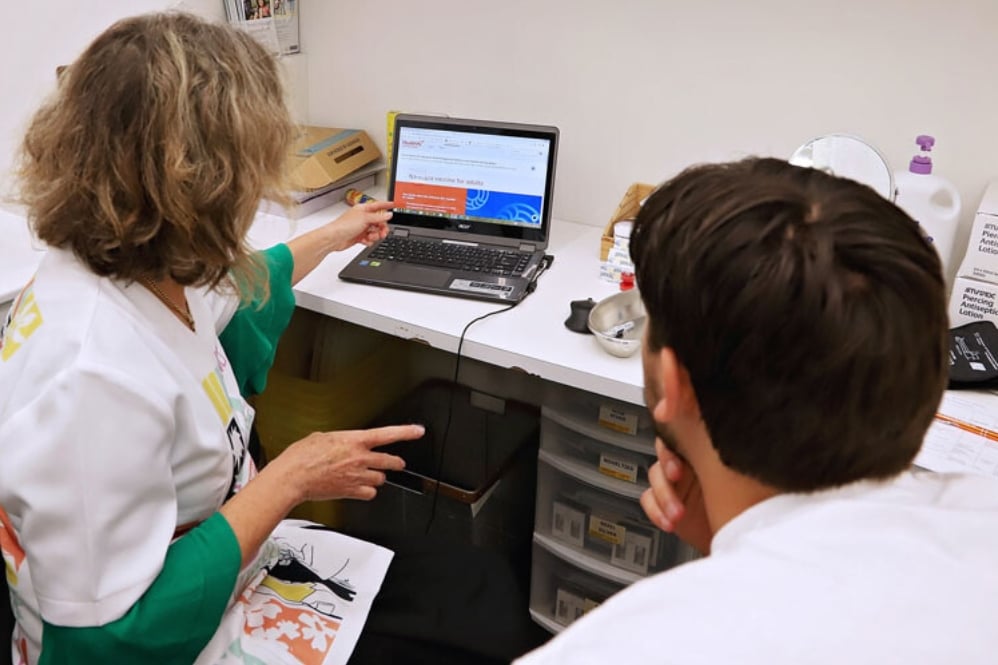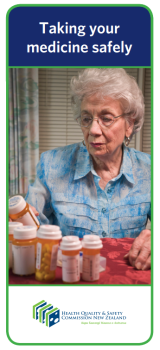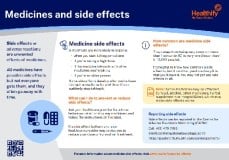Wishing everyone happy holidays and a joyful New Year from the Healthify team. Don't forget to Slip, Slop, Slap and Wrap!
Common questions to ask about the medicines you are taking
Key points about questions to ask regarding medicines
- The more you know about and understand your medicines, the more likely you are to take them safely.
- When you're prescribed a new medicine, ask your healthcare provider or pharmacist questions to help you understand the important things you need to know.
- You may already know what you want to ask but if not, here are a few examples to get you started.

VIDEO: Understanding your medicines
In this video, Healthify He Puna Waiora consumer representative and cultural advisor Merle Samuels shares tips for managing your medicines.
What is the name of my medicine?
You might not be able to remember the name of your medicine, so it's useful to have it written down. You may want to write the name in a way that helps you remember, such as how it sounds to say it. For example, paracetamol can be written as pa-ra-see-ta-mol.
Many medicines have at least two different names:
- the brand name – this is created by the company that made the medicine
- the generic name – this is the name of the active ingredient in the medicine.
For example, paracetamol is the generic name but different companies market paracetamol as Panadol®, Paracare®, Pamol® or Paracetamol (Ethics)®. You only have to remember one of the names – either the generic name, such as paracetamol, or the brand name of the medicine you take.
What is the medicine used for?
Find out what the medicine is used for and how it works. Some medicines can have many uses, so knowing why you've been prescribed the medicine is important.
When and how often do I take my medicine?
Some medicines work in your body over a long time, so they only need to be taken once a day. Other medicines work for a shorter time, so they may need to be taken more often, such as 2 or 3 times a day.
Some medicines only need to be taken when you need them for a reason, such as 'when required for headache'. They don't need to be taken all the time or when you don't have a headache.
Have my medicines changed?
Keep up to date with changes to your medicines by asking your healthcare provider, “Have any medicines been added, stopped or changed and why?”. This is particularly important at every healthcare provider’s visit and after you’ve spent time in a hospital.
To help you keep track of changes to your medicines, keep an up-to-date list of your medicines. This medicine list (sometimes called a yellow card) includes the name of the medicine, your dose, the time to take it, any special instructions and what it’s used for. This list also includes any over-the-counter medicines you buy, and any vitamins and herbal or dietary supplements you’re taking.
How long do I need to take this medicine for?
Some medicines are taken for a short time, such as antibiotics. Other medicines may need to be taken for months or years. Here are some more questions to ask your healthcare provider before you start taking the medicine:
- Is the medicine for a short time or is it expected to be for life?
- If I feel better, can I just stop taking it?
- Do I need to slowly reduce the dose or can I just stop taking it?
Does the medicine interact with medicines that I'm already taking?
Taking some medicines together may cause side effects or affect the way the medicine works – this is called an interaction.
Interactions can happen with prescription medicines, over-the-counter medicines, vitamin and mineral supplements, herbal or natural remedies, rongoā Māori, food and alcohol or recreational drugs. Before you take a new medicine or supplement, always ask your pharmacist if there will be any interactions.
Will I need any tests or monitoring while I'm taking the medicine?
To be sure that a medicine is working for you, that the dose is right, and/or that you don’t have side effects, you may need monitoring or tests.
For example:
- To know whether your blood pressure medicines are working, you will have your blood pressure monitored regularly.
- To check that a medicine isn’t causing liver or kidney problems, you may need to have blood tests now and again.
What possible side effects can I expect?
While you may not be able to prevent all side effects, being prepared for what to expect can help. Before you take any medicine, talk to your healthcare provider or pharmacist about:
- the common side effects to expect and how to deal with them
- how soon they may start
- if they may go away on their own
- if you need any tests to check for them
- what you can do to manage mild side effects
- when and who you should call for help, with more serious side effects.
You can ask your pharmacist for a printout of information about your medicines and for an up-to-date list of what you have been prescribed. Read more about side effects and reporting a reaction you think might be a side effect.
The following link provides further information on questions to ask about medicines:
Making wise choices about medicines(external link) NPS MedicineWise, Australia, 2022
Brochures
Ask your pharmacist for advice about your medicines(external link) Health Quality and Safety commission, NZ, 2015
Taking your medicine safely(external link) Health Quality and Safety Commission NZ, 2018
Medicines and side effects(external link) Healthify He Puna Waiora, NZ, 2024
5 questions to ask about your medications(external link) Health Quality and Safety Commission, NZ, 2019 English(external link), te reo Māori(external link)
Apps/tools
Brochures

Taking your medicine safely
Health Quality and Safety Commission NZ, 2018

Medicines and side effects
Healthify He Puna Waiora, NZ, 2024

Health Quality and Safety Commission, NZ, 2019 English, te reo Māori
Credits: Healthify editorial team. Healthify is brought to you by Health Navigator Charitable Trust.
Reviewed by: Stephanie Yee, Pharmacist, Auckland.
Last reviewed:





